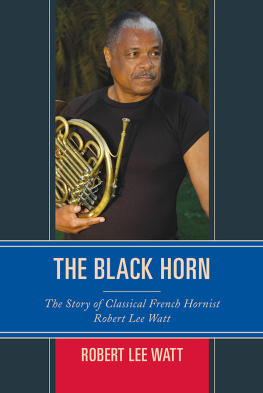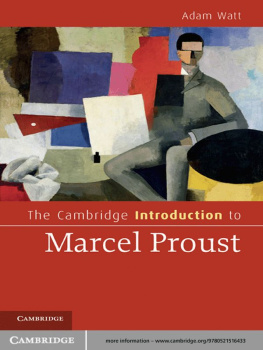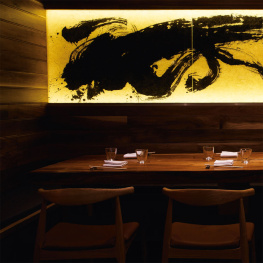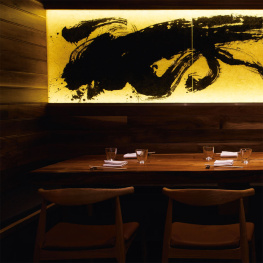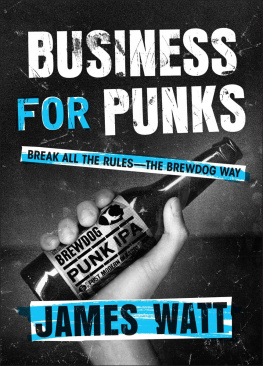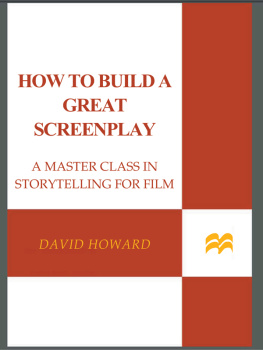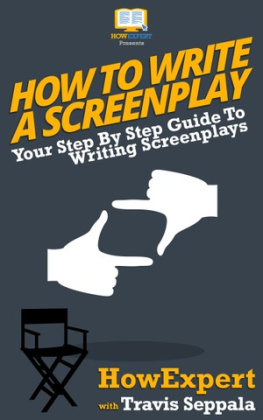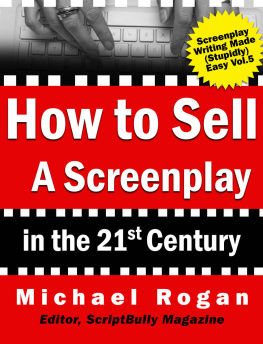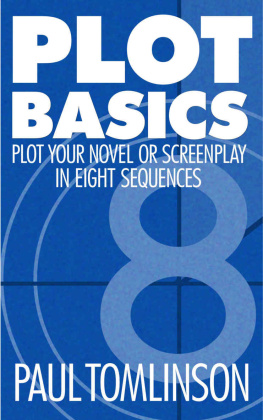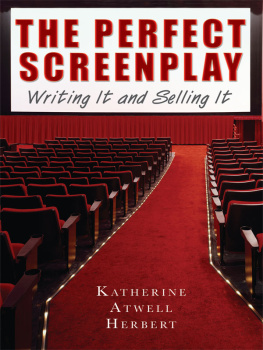PRAISE FOR THE 90-DAY SCREENPLAY
If youre serious about your writing, buy this book. Even as a working professional, I refer back to it constantly. Theres a kind of relaxed, organic approach to the instruction that feeds your creativity instead of robbing it with hard-and-fast rules about writing. The exercises presume that your unconscious knows exactly what the story is about and how it should lay out. All you have to do is get quiet and not interfere with the process. I love that idea because it takes all the pressure off. The more we try to force or muscle the story into shape, the more we get away from what its really about. Als book is incredibly clear and accessible. You dont need to have any background at all in screenwriting to follow it. The 90-Day Screenplay is a great addition to any writers library.
-JESSICA SHARZER
(writer, co-executive producer American Horror Story)
I am blown away by The 90-Day Screenplay! Im applying the principles to my current works in process as I will for all future projects. It is helping to reshape my understanding of character and story. This invaluable tool will never be far from my side.
- PAMELA FALK
(screenwriter of The Wedding Planner)
Rather than just a blueprint for cookie-cutter storytelling, The 90-Day Screenplay provides a road map to explore all those tangled corners of the soul where the best stories are hiding. This book is a boundless resource, filled with simple yet profound instruction, and should be state-mandated reading at the front gates of Hollywood.
- AARON LEE
(writer/producer, Family Guy, The New Normal)
The 90-Day Screenplay is not just for writers, but for producers who want to know how their product is made.
- DAVID STREIT
(co-producer of Internal Affairs, Rivers Edge)
Alan Watt understands that you cannot think your way to a good screenplay. You dream it into being. The 90-Day Screenplay makes sure that you capture the dream before your left brain has a chance to banish it with doubt and judgment.
- ALLISON BURNETT
(screenwriter of Autumn in New York, Feast of Love, Gone)
Alan Watts step-by-step journey through the creative screenwriting process is wise, illuminating and encouraging from start to finish. More importantly, it will help you start, finish and not get lost on page 42. Its the best 90-day investment Ive made yet. - JorDan rane (Scriptapaloozas Grand Prize Winner for his screenplay GOAT) In a field littered with formulaic pap, Watts approach has heart and soul. Ive been a professional writer for nearly three decades, including a rewrite on a script that won an Academy Award, and for my money this is the best screenwriting guide on the market today.
- PHILIP MCGRADE
(writer, Brand X, The Late Late Show with Craig Ferguson)
Whether youre a first time writer or a seasoned professional, Alan Watt guides you, inspires you, teaches you, and ultimately demands that you write your screenplay. Why? Because nobody but you can tell it. He gives you the tools needed to unlock the heart of your story, with the confidence to follow your instincts. A true gift! Read the book. And then... read it again!
- NANCY NEUFELD CALLAWAY
(writer, MarriedWith Children, In Living Color)
The 90-Day Screenplay is a game-changer. This is not a book that sits on your shelf. Its a proven process for anyone who has ever wanted to write a screenplay but has been too frozen by panic to get off their ass and do it. I wish Id had this book when I started. It would have saved me five years of laying on the couch and shuddering in dread for fear of the unknown.
- HOWARD BUSGANG
(writer/executive producer Boy Meets World, Working the Engels)

The 90-Day Screenplay Copyright 2014 by Alan Watt
All rights reserved.
No part of this book may be reproduced without permission in writing from the publisher.
ISBN 978-0-9831412-3-5
A publication of The 90-Day Novel Press.

For information on L.A. Writers Lab workshops, please visit lawriterslab.com
To Mary-Beth
If you can dream it, you can do it.
WALT DISNEY
TABLE OF CONTENTS


THE 90-DAY SCREENPLAY:
THE OUTLINE EMERGES
WRITING THE FIRST DRAFT
THE REWRITE


I n 1998, I was invited to teach a summer screenwriting course at UCLA. I was fairly new to Los Angeles, and although I had yet to sell a screenplay I had signed with a big-shot agency and was getting meetings around town for my scripts. There was only one problem: I couldnt write a third act. Not really. I wrote interesting characters, compelling scenes, and dramatic set pieces, but deep down I knew that the whole never amounted to more than the sum of its parts. I had read every book on screenwriting and attended every seminar, but my scripts never quite came together in that magical way that happened in my favorite movies.
The reason, though I wasnt aware of it at the time, is that I was trying to control the process. In trying to figure out the story, I was not making myself available to the full reaches of my imagination. In my attempt to follow the rules outlined by all the books and classes, I had lost connection to the primal impulse that was guiding me.
In my experience, most Hollywood screenwriting books and workshops are taught by story analysts rather than working writers. In fact, most screenwriting books approach story from a left-brain perspective, deconstructing the work of other screenplays with the tacit notion that writing a script is simply a matter of figuring out how to assemble a series of parts into a satisfying whole. It is akin to doing an autopsy in order to discover what it means to be human. The fact is that each story is unique and has an infinite number of parts moving in concert. We cannot possibly contain all of this information in our pre-frontal cortex. We dont have the bandwidth.
However, our subconscious does.
Our subconscious is the seat of our genius. It makes connections and constructs patterns we may only recognize in retrospect. Our job is not to figure out our story, but rather, to keep our left-brain busy by asking it the right questions in order for our subconscious to do its work. When we get stuck, we tend to ask ourselves questions like, Why is this so difficult? And our trusty brain gives us answers. It tells us that we did not have a sufficiently difficult childhood to be a writer, or that we are undereducated, or overeducated, or any number of other excuses to keep us from getting our story onto the page.
In 2002, I founded L.A. Writers Lab and over the past decade, through working with hundreds of writers, a method has emerged. The 90-Day Screenplay is about giving our conscious mind specific tasks and goals so that our subconscious can do the heavy lifting. In this way, we are marrying the wildness of our imagination to the rigor of story structure.
Next page
![Watt The 90-day screenplay : [from concept to polish]](/uploads/posts/book/103527/thumbs/watt-the-90-day-screenplay-from-concept-to.jpg)
